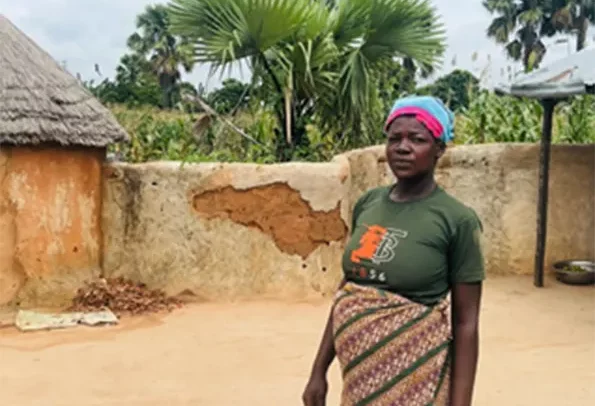Cynthia, a pregnant woman from Gberuk community
“I have been forced to walk long distances to either Nakpanduri or Binde health facilities to access antenatal services due to the conflict situation in Gberuk, near Bimbagu,” says Cynthia, a 28 year old pregnant woman.
The Gberuk CHPS Compound, has been closed down due to the conflict between the Naniik and Gberuk communities near Bimbagu in the Bunkpurugu-Nakpanduri District of the North East region.
A visit by DAILY GUIDE to the Gberuk CHPS compound revealed an abandoned facility, empty and dusty.
Health workers and teachers have fled the communities for fear of their lives due to the conflict in the area.
Speaking with DAILY GUIDE, Cynthia indicated that the closure of the health facility in the community has greatly affected access to health care for residents, especially pregnant women.
“We used to go for health services at the facility here but since the conflict started, the facility has been closed down and all the workers have left. This has forced us the pregnant women in this community to look elsewhere for health services,” she said.
She expressed worry about the risk involved in walking long distances to access healthcare outside their communities.
“I am afraid that when I’m about to give birth, it will be a challenge because I would need to access the Nakpanduri hospital or the Binde hospital which is a long distance from my community,” she explained.
Cynthia revealed that she sometimes resort to local herbs anytime she faces challenges with her pregnancy due to the lack of access to health facility in the community.
She thus appealed to authorities to come to their aid and resolve the conflict between the two communities for peace to return to the area.
“A lot of pregnant women could not endure the stressful walking and other risky situation due to the closure of the health facility here and so have relocated to other communities where they can get access to health care,” she noted.
Health Directorate
Dr. Braimah Baba Abubakari, former North East Regional Director of the Ghana Health Service, during an Annual Sector Performance Review Meeting, lamented the continuous shutdown of health facilities due to conflict situations.
According to him, the shutdown of these facilities affects health delivery in the affected areas in the region.
Sustainable Development Goal 3
Sustainable Development Goal 3 (SDG 3) focuses on ensuring healthy lives and promoting well-being for all at all ages. SDG 3 aims to reduce the global maternal mortality ratio as well as seeks to end preventable deaths of newborns and children under five.
Maternal mortality
Madam Blessilla Na-afoe Kandoh, Development Specialist/SRHR/GBV Expert, noted that closure of the Gberuk CHPS compound as a result of the ongoing conflict has profound implications for maternal and child health in the Bunkpurugu-Nakpanduri District.
“For pregnant women, loss of access to essential antenatal, delivery, and postnatal services means that common complications such as hemorrhage, eclampsia, infections, or obstructed labor may go unmanaged, turning preventable conditions into fatal outcomes,” she stated.
According to her, eventhough the North East Region significantly reduced its institutional maternal mortality ratio from 84.8 per 100,000 live births in 2021 to 30.5 in 2022, closures like this threaten to reverse these gains, and preventable deaths among both mothers and newborns become inevitable.
“Beyond clinical outcomes, the psychosocial impact on pregnant women in conflict-affected communities cannot be overlooked. Anxiety over where to deliver, stigma around unsafe home births, and the trauma of displacement or violence compound the health risks. In addition, children in these communities lose out on routine services such as immunisation and growth monitoring, which are critical to their survival,” she hinted.
She called for urgent measures to ensure that the health facility is reopened to enhance health delivery in the community.
“Restoring access to healthcare must therefore be treated as an urgent priority. This requires not only reopening the Gberuk CHPS compound but also ensuring safe passage for health workers, mobile outreach to reach displaced populations, and strengthened emergency referral systems. In the longer term, health services in conflict-prone districts should be embedded within broader peacebuilding and protection strategies, so that women and children are not left to carry the heaviest burden of insecurity,” she appealed.
FROM Eric Kombat, Bimbagu


